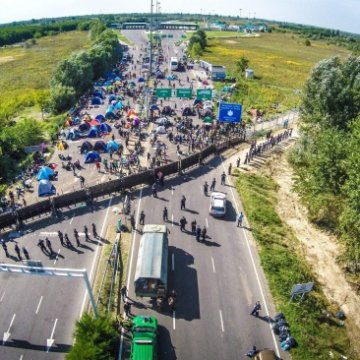- About
- Topics
- Picks
- Audio
- Story
- In-Depth
- Opinion
- News
- Donate
- Signup for our newsletterOur Editors' Best Picks.Send
Read, Debate: Engage.
| topic: | Refugees and Asylum |
|---|---|
| located: | Hungary, Serbia |
| editor: | Magdalena Rojo |
Starving adults and children, lack of medical care, an overcrowded border camp – such was the image of the transit zone Roszke at the Hungarian side of the Serbian-Hungarian border.
The European Court of Justice (ECJ) has recently ruled that such detention of asylum seekers was unlawful according to EU laws. The court said that the conditions prevailing in Roszke amount to a deprivation of liberty. People detained in the transit zone had no option to leave the place in any direction. Hungary did not grant them asylum and Serbia did not want to accept them back once they had crossed the border.
Four migrants from Afghanistan and Iran brought the case to the court, as they were rejected asylum. According to the amendments from 2018 to the Hungarian asylum act, "any non-Hungarian citizen arriving in the territory of Hungary through a country where he or she was not exposed to persecution or a direct risk of persecution shall not be entitled to asylum." As Hungary considers Serbia a safe territory, Hungarian authorities argued that the four migrants should have asked for asylum there.
Under the rule of the far-right party Fidesz and the Prime Minister Viktor Orban, the strict anti-immigration policies and measures have been approved in Hungary, such as building a fence at the border shortly after the migration crisis started in 2015 and the criminalisation for helping refugees.
All these measures have been criticized by EU institutions, politicians across the region, and human rights activists. The last ruling of the ECJ was not the first time that the court ruled anti-immigration steps of Hungary illegal. At the beginning of April, the ECJ decided that Hungary, together with Poland and the Czech Republic, breached their obligations when they did not accept refugees and migrants within the relocation programme in 2015. Back then, the European Council, composed of head of states and major leaders, adopted a burden-sharing measure to help Italy and Greece deal with hundreds of thousands refugees and migrants entering Europe. Hungary never accepted any asylum seekers and criticised migration quotas from the beginning.
The anti-immigration narrative has been a part of Viktor Orban's political approach. After the ECJ ruled the closing of transit zones at the border, the Hungarian government moved around 300 asylum seekers from there to reception centres across the country. Gergely Gulyas, Orban's chief of staff, commented on the ruling that Hungary considers this move "a risk with regard to European security."
Expecting that Orban will change his attitude towards migrants and refugees would be utopic. However, the fact that the ECJ set boundaries to the measures taken in Hungary is positive news, not only for refugees and migrants but also for all of us living in Europe.
It is a message that there is no place for autocratic regimes keeping people in prison-like conditions and that the EU still values human rights – not only on the paper.
Image by freetheroszke11now

